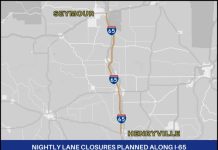A consultant has recommended Bartholomew County consider imposing a food and beverage tax to fund growth in sports tourism.
But that option from the Phoenix-based Huddle Up Group LLC is far from becoming a formal proposal, Columbus Area Visitors Center Executive Director Karen Niverson said.
Huddle Up Group was hired by the visitors center last year to create a strategic plan to grow sports tourism, and one of its recommendations is implementing a food and beverage tax. In Indiana, such a tax can be 1 percent of the gross retail income received from taxable food and beverage transactions.
However, when both a county and a municipality located within that county have imposed the tax, the rate is 2 percent in the municipality, Niverson said.
The Huddle Up Group presented its findings to the Visitors Center board, as well as some partnering organizations, in April, Niverson said.
Since most hotels are booked completely and recreational facilities are reserved from May through September, the consultants told the group the Columbus area doesn’t have much additional capacity to grow sports tourism during the summer months, she said.
“If we want to grow sports tourism to the next level, we need to look at some year-round options,” Niverson said. “We need to consider indoor sports facilities.”
The Huddle Up Group suggested enacting a food and beverage tax as a way to fund those facilities. Although there are no local figures available, a similar tax in Madison County — about 50 percent larger in population than Bartholomew County — generates about $2 million annually, the Herald Bulletin of Anderson reported.
But the Visitors Center in Columbus must first complete months of homework before considering proposing such a tax to local elected officials, Niverson said.
That homework, according to Niverson, includes:
Examining which facilities are best for Columbus.
Operational expenses for such facilities.
Questioning other communities to determine what type of capital costs would be involved.
The amount of revenue such facilities might bring in.
Determining other funding priorities for the city and county.
Determining public support.
“There is no timeline for proposing the tax,” Niverson said. “Feasibility is what’s important for us. We want to make sure that what we do is sustainable.”
In a separate recommendation, Huddle Up Group suggested that the Visitor’s Center’s sports tourism division develop its own unique sub-brand, she said.
“The term ‘Visitors Center’ doesn’t translate well in sports marketing,” Niverson said.
This is not the first time that a food and beverage tax has been proposed in Bartholomew County.
After the Indiana Association of Cities and Towns began urging local government to find alternative financing options to property taxes, former Columbus Mayor Fred Armstrong suggested a food and beverage tax in his 2006 State of the City address.
That year, a number of political candidates said they liked the tax’s ability to generate revenue from out-of-town visitors, instead of just local residents, but the measure did not advance.
“When you think about it, the idea is that visitors are also using our infrastructure, so it only makes sense that they share in the costs,” Niverson said.
In 2016, the Indiana General Assembly discussed a proposal to create a statewide uniform food and beverage tax, but the bill failed to find support.
[sc:pullout-title pullout-title=”Who else has the tax?” ][sc:pullout-text-begin]
The food and beverage tax applies to any transaction in which food or beverage is furnished, prepared, or served by a retail merchant for consumption at a location or on equipment provided by the retail merchant.
The tax constitutes 1 percent of the gross retail income received from taxable food and beverage transactions. However, when both a county and a municipality located within that county have imposed the tax, the rate is 2 percent in the municipality.
There are 15 Indiana cities, including Nashville in Brown County, that have enacted a 1 percent food and beverage tax. Among 12 Indiana counties with a 1 percent tax are neighboring Johnson and Shelby.
Indiana cities where a 2 percent tax (combined city and county) is assessed include: Avon, Brownsburg, Carmel, Lebanon, Noblesville, Plainfield, Westfield and Zionsville.
All of Marion County, as well as the historic hotel resorts in Orange County, charge a 2 percent food and beverage tax.
Source: Indiana Department of Revenue
[sc:pullout-text-end]




